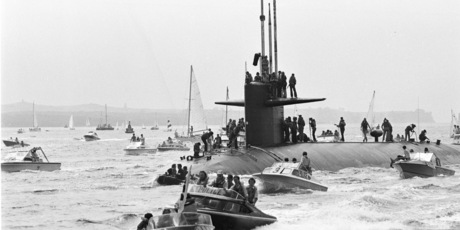NZ memories: Anti-nuclear policy refuses US warship
By John Roughan
150 years of memories: In 1984 we knew we could stand up to anyone.

American Navy Nuclear Submarine USS Haddo arriving in Auckland on 19 January 1979. File Photo / NZ Herald
It was quiet Sunday night, Parliament was nearly deserted. The Herald office was the only room in the press gallery with a light still on when a backbench MP in the Labour Government came in the tell the duty reporter what was happening.
Next morning the front page lead reported that cabinet ministers had come under a full scale "fax attack" from party members worried that the cabinet meeting that day would accept a visit by a United States warship, USS Buchanan.
They had reason to be worried. Deputy Prime Minister Geoffrey Palmer had spent the previous week carefully explaining how the Government proposed to make the decision without challenging the US Government's refusal to confirm or deny whether the conventionally-powered Buchanan was carrying nuclear weapons.
The fax attack, orchestrated by party president Margaret Wilson, former president Jim Anderton and his caucus colleague Helen Clark, had the desired effect. Whatever hopes Prime Minister David Lange had entertained that he could reconcile the anti-nuclear policy with the Anzus alliance, were dashed that night.
His party members were already choking on free market economic reforms they had never imagined a Labour Government would adopt. A compromise on the party's long-standing opposition to nuclear power and Anzus was not on.
When the cabinet refused to accept the Buchanan, the US and Australia declared their alliance with New Zealand "suspended". The US froze New Zealand forces out of future military exercises and made Lange unwelcome in Washington.
The American reaction turned public opinion in New Zealand strongly behind the anti-nuclear policy. By the time legislation was passed in 1987, establishing the nuclear ban in law, New Zealanders regarded it as a test of their right to make the decision.
Anti-nuclear protesters had come a long way from flotillas on the Waitemata against visiting US warships. With the help of clumsy US diplomacy they made nuclear freedom an issue of national pride that future Governments dared not change.
Both countries soon recognised their alliance could never be revived but with the passage of time, and military efforts in Afghanistan, the rift is healing.
New Zealand prime ministers are now welcomed at the White House and its forces are slowly regaining invitations to joint exercises. The country has proved its sovereignty to itself.
Source: The New Zealand Herald, Auckland, New Zealand.
No comments:
Post a Comment